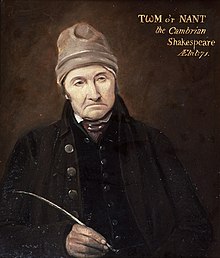Twm o'r Nant
Twm o'r Nant | |
|---|---|
 | |
| Born | Thomas Edwards January 1739 Llannefydd, Denbighshire, Wales |
| Died | April 3, 1810 (aged 71) |
| Resting place | St Marcella's Church, Denbigh |
| Nickname | "The Cambrian Shakespeare" |
Twm o'r Nant ('Tom from the Brook') was the pseudonym of a Welsh language dramatist and poet, Thomas Edwards (January 1739 – 3 April 1810), also known as Tom of the Dingle. He was famous for anterliwtau (interludes or short plays), which he performed mainly round his native Denbighshire.[1][2]
Earlier life
Edwards was born in Llannefydd, Denbighshire (now in Conwy County Borough). As a child, he moved with his parents to Y Nant Isaf (Welsh for 'Lower Brook'), near Nantglyn, from which he took his pseudonym. Edwards had little formal education: he attended one of Griffith Jones's circulating schools, where he learnt to read, and a school in Denbigh for two weeks to learn English.[1][3] However, he was eager to learn to write – he cadged writing paper and wrote with ink that he made from elderberries.[4]
In 1749 Edwards joined a company of touring actors, which typically performed on an improvised stage such as a cart. He wrote seven interludes before he was 20 years old, but all have been lost.[2][3]
In 1763 Edwards married Elizabeth Hughes, the wedding being conducted by the poet-priest
Social comments
The interludes Edwards wrote feature social evils of his day. He often notes unpopular taxes, greedy landowners, swindling lawyers and immoral clergymen.
Edwards took part in the annual
Edwards died on 3 April 1810. He was buried at St Marcella's Church, Denbigh, where there is a memorial to him.[1]
Legacy
Edwards's interludes were published after his death: a collection of six appeared with Isaac Foulkes in 1874.[7]
George Borrow devotes two chapters to Edwards in his 1862 travel book Wild Wales: Its People, Language and Scenery. He includes a translation of part of an interlude by Edwards, entitled Riches and Poverty.[4][8]
In 1974 the Welsh playwright Dedwydd Jones published Bard:A Play on the Life and Times of Twm o'r Nant. This was commissioned for the opening of the Sherman Theatre, Cardiff.[9][10]
References
- ^ .
- ^ a b "Twm o'r Nant's former home, Denbigh". HistoryPoints. Retrieved 2 June 2015.
- ^ doi:10.1093/ref:odnb/62647. (Subscription or UK public library membershiprequired.)
- ^ a b Borrow, George. "Chapter 59: History of Twm O'r Nant [...]". Wild Wales: Its People, Language and Scenery. University of Adelaide. Archived from the original on 22 February 2008.
- ISBN 9781900639439.
- ^ "1789 and the Gwyneddigion Eisteddfodau". National Museum Wales. Retrieved 3 June 2015.
- ^ Edwards, Thomas (Twm o'r Nant) (1874). Gwaith Thomas Edwards-Twm o'r Nant, etc (in Welsh). Liverpool: Isaac Foulkes.
- ^ Borrow, George. "Chapter 60: Mystery Plays [...]". Wild Wales: Its People, Language and Scenery. University of Adelaide. Archived from the original on 22 February 2008.
- ^ Jones, Dedwydd (1974). Bard: a play on the life and times of Twm O'r Nant. Cambridge: Land of Cokaygne Ltd.
- ^ Jones, Dedwydd. "Bard" (PDF). Dedwydd Jones. Retrieved 16 June 2015.
